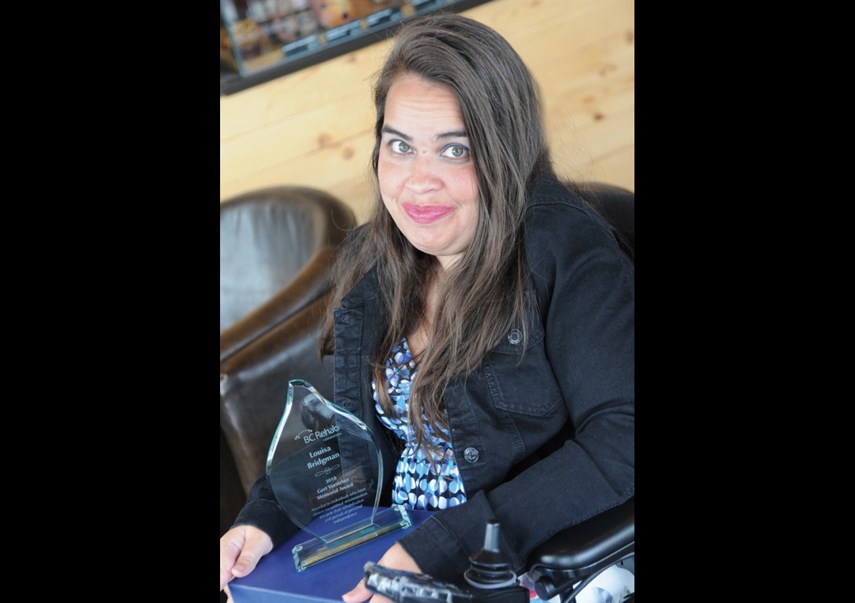Her second hip replacement was the bad one, she says.
“The first one felt like a breeze,” Louisa Bridgman explains with a grin.
Sipping a too-sweet coffee concoction on Lonsdale Avenue, Bridgman talks about living with cerebral spastic palsy as she cradles her BC Rehab Gert Vorsteher Memorial Award.
“Next to my high school graduation it’s probably the next biggest accomplishment,” she says.
The award is reserved for people with disabilities who show: “remarkable determination” in their rehabilitation.
Bridgman’s hip replacement was followed by gall bladder surgery. The Central Lonsdale resident recalls the weeks following surgery as a haze of pain and malnourishment as just about all the food she managed to get down refused to stay there.
But the pain was something she went through. Recovery was what she had to put herself through.
That meant near-daily pilgrimages to G.F. Strong, a rehabilitation clinic just off Cambie Street in Vancouver.
On those days when the place was packed, Bridgman was there. In the days when the sky opened up and dropped mounds of snow across Vancouver and most patients cancelled their appointments, Bridgman was there. She did stretches, range of motion work and strength training with physiotherapists, occupational therapists and doctors to recover as quickly as she could.
“They work their butts off to help as many people as they can, she says of G.F. Strong’s staff.
To expedite the process Bridgman also hired a personal trainer.
“I’ve always been driven,” she says. She was motivated to get well again, but she also liked the idea of: “proving that I could do it when everything was stacked against me.”
Bridgman estimates she’s had 50 surgeries.
“Every day is the same day and every day is a different struggle,” she says.
Rehabilitation is often about self-care: my pain, my limits, my goals. But Bridgman always had her eye on the bigger picture. Having seen as much of the medical system as she has, she’s determined that something needs to change to help people with disabilities spend less time in the hospital.
According to a 2015 report from the BC Care Providers Association, the cost of residential care is 75 to 89 per cent less expensive than acute care.
“I was in there for three weeks when I could’ve been home in three days,” Bridgman says of her most recent stay.
“If the government was willing to give us the proper equipment and the proper healthcare to stay home, we wouldn’t have to spend $70,000 for three weeks of being in an acute care bed in the hospital.”
Besides saving the government money, the change would also improve quality of life for people with disabilities, she says.
“It would allow me to be able to be more independent, to be able to work more, to be able to contribute more to my community, to be able to give back to the economy when I’m constantly feeling like I’m taking because I’m in constant need of the government’s help,” she says. “I have this overwhelming feeling all of the time. ... I feel like I’m a burden to society.”
That feeling is exacerbated when treatments Bridgman considers essential, like acupuncture and massage, are treated as extras, and when items like a wheelchair seat lift are deemed luxuries. But a wheelchair seat lift, Bridgman explains, would allow her to do everyday activities like grocery shopping without needing to rise out of her chair.
“If I try to stand up with my spastic CP, I could fall, and if I fall that’s another $30,000 surgery,” she says.
“Yes, it’s money upfront,” she acknowledges. “But all that money would come back to (the government). ... They’re just not looking at the big picture.”
To help governments get a better look at that big picture, Bridgman is hoping to use the $5,000 bursary that came with the award to pursue a degree in political science. Having worked alongside former North Vancouver-Lonsdale MLA Naomi Yamamoto, (a friend she refers to as, “the lovely Naomi Yamamoto.”) Bridgman says she’s eager to work along different levels of government to advance the cause of people with disabilities.
Bridgman is hoping to go to Capilano University and possibly transfer to UBC.
“I want people to see that people with disabilities are no different, the only difference is we sit on our asses,” she says. “Don’t be scared of us. Just accept us, just like we accept you.”



